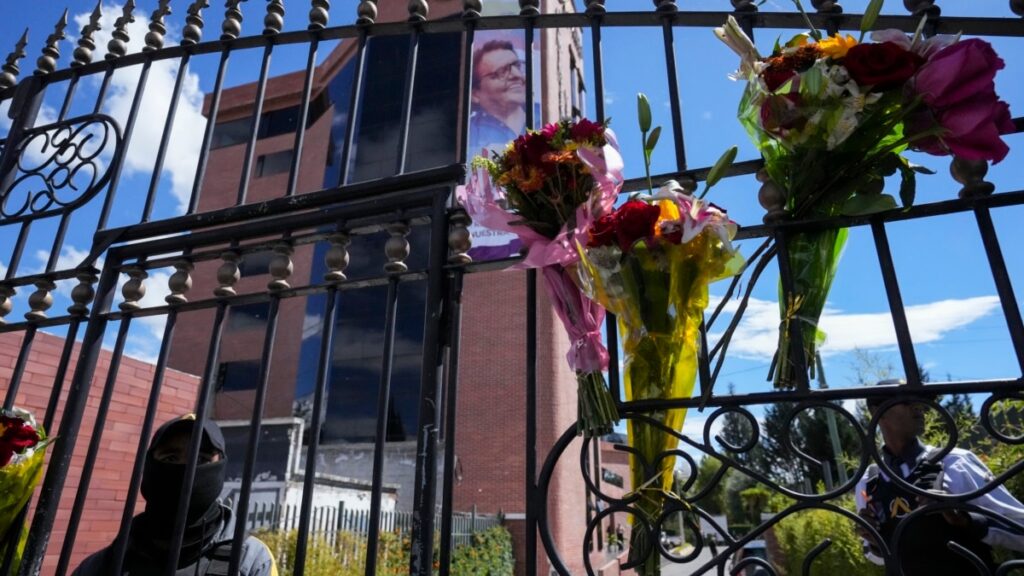Washington — The level of violence in electoral campaigns in Latin America has reached its peak with the assassination of presidential candidates in countries like Colombia, Mexico, and, most recently, Ecuador, revealing the extent of organized crime’s infiltration and its ability to strike fatal blows to aspiring leaders. With the murder of candidate Fernando Villavicencio on Wednesday as he left a rally at an educational center in Quito, Ecuador, memories of similar events in violence-ridden countries permeated by organized crime resurfaced. The assassinations of Colombian presidential candidate Luis Carlos Galán from the Nuevo Liberalismo party on August 18, 1989, and of Luis Donaldo Colosio, leader of the Institutional Revolutionary Party (PRI) in Mexico, on March 23, 1994, bear similarities to the circumstances surrounding Villavicencio’s death on August 9. These three slain presidential candidates also shared a common message: to fight against organized crime, combat corruption, and battle drug trafficking and insecurity. In Colombia, two other presidential candidates seeking popular support to implement socialist agendas were also assassinated during different periods in crimes that remained unsolved, such as the assassination of opposition leader Jorge Eliécer Gaitán in 1948 and the murder of Communist Party leader Bernardo Jaramillo Ossa on March 22, 1990. Luis Carlos Galán, a liberal reformist and enemy of Pablo Escobar, was killed by hitmen from the Medellín cartel while campaigning outside Bogotá. The second half of the 1980s marked the beginning of a spiral of violence in Colombia involving organized crime structures, self-defense or paramilitary groups, and widespread penetration by drug cartels. The Truth Commission, following the Peace Agreements, stated in its report that the death of presidential candidate Luis Carlos Galán was the result of a frontal attack by the state against drug cartels. El Colombiano magazine, when reviewing the death of the Colombian presidential candidate years later, considers that «Luis Carlos Galán knew he was going to be killed,» as he had survived an unsuccessful assassination attempt by the perpetrators two weeks prior. Luis Carlos Galán supported the extradition of drug traffickers to the United States to serve their sentences in the North American nation. The campaign against extradition had sparked a frontal war between the state and cartels that demonstrated their operational capacities in decapitating high-level government officials, from ministers to judges and high-ranking military officials. Galán had embarked on a crusade to curb the power and penetration of drug trafficking in Congress since 1982, according to documents from that time, and took actions and made statements against Pablo Escobar himself, who could not explain as an elected official the origin of his growing wealth. Galán believed that «he couldn’t have people by his side who couldn’t explain the origin of their income; he doubted their connections to drug trafficking» when the drug lord attempted to donate money to the first presidential campaign of the liberal reformist. On the day of the events, late on the night of August 18, 1989, Galán arrived at the central square of Soacha, Cundinamarca, on the outskirts of Bogotá, making his way through the crowd that had gathered to hear him speak. Surveys had already positioned him as the favorite for the upcoming electoral contest. The candidate climbed onto the improvised stage and began his discourse to the crowd. Fifteen minutes had passed when the first bursts of machine gun fire were heard. Confusion reigned as there were also fireworks to welcome him. Panic quickly spread as the shots intensified, and Galán fell to the stage. Subsequent investigations revealed that the hitmen had positioned themselves under the stage and fired until they hit their target. In critical condition, Galán was transported to Hospital Boston and then to Kennedy Hospital, both medical centers in Bogotá, but at 10:45 p.m., it was announced that he had died. Galán’s assassination left an indelible mark on Colombia and its fight against drug trafficking. Investigations into the crime have remained open in order to bring all those responsible to justice. Among those involved in the plot with the Medellín Cartel, led by Pablo Escobar, was also Alberto Santofimio, a liberal politician in the service of the mafia, who aspired to fill the void left by the murdered candidate. Luis Donaldo Colosio and the denouncement in Mexico Luis Donaldo Colosio was assassinated while leaving a campaign event by a shooter who approached him at point-blank range in Baja California. The assassination of PRI presidential candidate Luis Donaldo Colosio on March 23, 1994, when the party had continuously governed Mexico in one presidential election after another and the candidate was already seen as the future leader of Mexico, was a significant event. Colosio proposed a change in Mexico’s politics, particularly addressing corruption within the government apparatus. The event has been referred to in Mexico as a «magnicide» due to the political atmosphere at the time and alleged power struggles within the ruling party. Investigative failures and a series of errors in gathering evidence led to the consideration of a conspiracy behind the assassination. The «Report on the Investigation of the Homicide of Luis Donaldo Colosio Murrieta ‘The Crime and Its Circumstances,'» prepared by the Office of the Attorney General of the Republic (PGR), ruled out the theory of a lone assassin. The investigative team also stated that there were «concerted actions» within the security ring to allow the shooter to approach the candidate at point-blank range as he left a political rally in Lomas Taurinas, Baja California. Luis Donaldo Colosio had given a speech during a day of campaigning in the Mexican border state. The schedule had been adjusted to include several engagements, including the attack, and had experienced changes in timing. A surveillance camera recording captured the moment when the assailant approached and shot the candidate in the head as he walked through the crowd. He was also shot in the chest. Investigations and errors prevented the determination of the origins of the shots. The recording remained «classified» for many years until the National Institute of Access to Information decided in 2018 that it should be released from restriction, fueling conspiracy theories. Ecuador and the alarm over organized crime Fernando Villavicencio was assassinated on Wednesday, August 9, while leaving a campaign event in the Ecuadorian capital, Quito. Ecuadorian candidate Fernando Villavicencio had dedicated a significant part of his life to exposing corruption and, more recently, engaged in a clear confrontation with organized crime networks and drug trafficking gangs that have put the South American country on high alert. As part of the «Movimiento Construye» party, the presidential candidate, who was not a favorite in the polls until then, was making a name for himself in Ecuadorian politics with a speech focused on these central issues plaguing the country. During his time as a member of the National Congress since 2021, he had dedicated himself to fighting corruption, particularly in the energy sector. As the President of the Oversight Commission of the Assembly, he carried out 24 reports that revealed irregularities in contracts with companies in the oil and hydroelectric industries involving the state. His political achievements also included his break from former President Rafael Correa’s administration in 2007 as part of a group of experts who opposed a contract with Petrobras due to «prejudices against» Ecuador. On the afternoon of Wednesday, August 9, during the attack, a social media video captures the crowd and the security team clearing a path for the candidate to reach his vehicle. However, as he enters with the door still open, explosions are heard, and chaos ensues. [end of the content]
Fuente de TenemosNoticias.com: www.vozdeamerica.com
Publicado el: 2023-08-12 09:35:25
En la sección: América Latina – Voice of America

